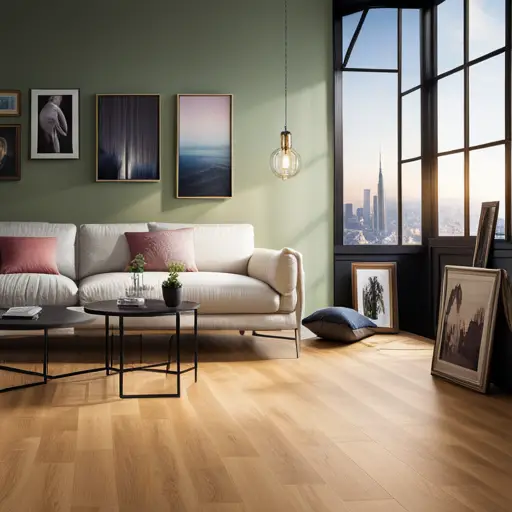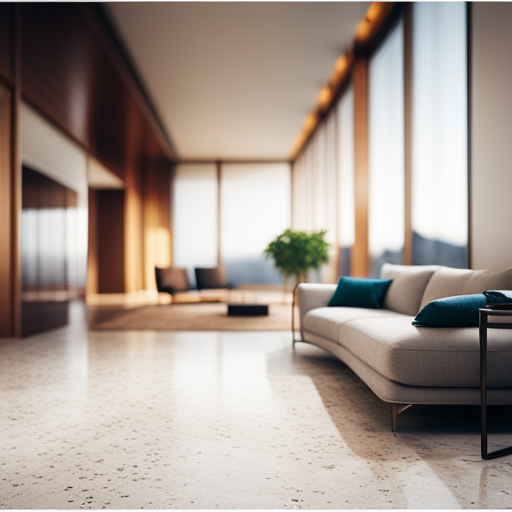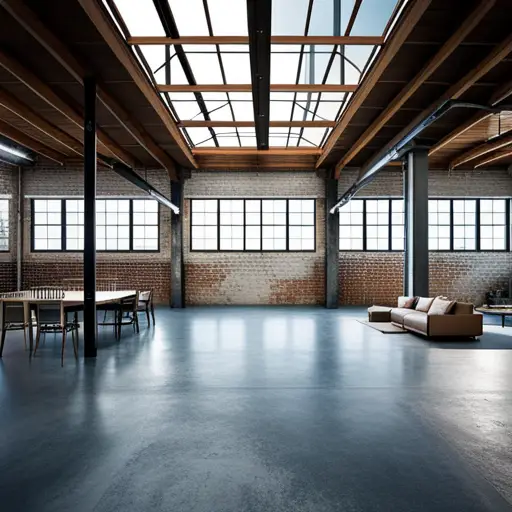Vinyl Flooring: An Affordable Alternative to Hardwood

Like a budget-friendly chameleon, vinyl flooring seamlessly adapts to any space, offering an affordable alternative to traditional hardwood.
In this article, we will explore the benefits of vinyl flooring, its durability, low maintenance, versatile design options, and cost-effectiveness.
Whether you’re renovating a high-traffic area or seeking a stylish, yet practical flooring solution, vinyl proves to be a reliable and stylish option for any home.
Benefits of Vinyl Flooring
Vinyl flooring offers numerous benefits, making it a cost-effective and durable option for homeowners and businesses alike. One of the key advantages of vinyl flooring is its easy installation. With the availability of vinyl planks and tiles that come with self-adhesive backing, installation becomes a straightforward process, often suitable for DIY enthusiasts. Additionally, some vinyl flooring options are designed with click-lock systems, further simplifying the installation process.
Another important benefit of vinyl flooring is its minimal environmental impact. Unlike some traditional flooring materials, vinyl is recyclable and can be made from recycled materials. Furthermore, the manufacturing process of vinyl flooring consumes less energy compared to other flooring options, contributing to its lower environmental footprint. Additionally, the durability of vinyl flooring contributes to its sustainability, as it reduces the need for frequent replacement and minimizes waste.
Durability and Maintenance
When considering the durability and maintenance of vinyl flooring, it is essential to understand its long-term performance and upkeep requirements.
Vinyl flooring is known for its durability, making it a popular choice for high-traffic areas in homes and commercial spaces. It is resistant to scratches, stains, and water, making it an ideal option for kitchens, bathrooms, and other areas prone to moisture and spills.
Additionally, vinyl flooring is relatively easy to maintain, requiring simple cleaning routines to keep it looking its best.
-
Regular cleaning: Sweep, vacuum, or dust mop the vinyl flooring regularly to remove dirt and debris. Use a damp mop with a mild cleaner to remove any stubborn stains or spills.
-
Avoid harsh chemicals: When cleaning vinyl flooring, avoid using harsh chemicals or abrasive cleaners that can damage the surface. Instead, opt for pH-neutral cleaning solutions recommended for vinyl floors.
-
Use protective pads: To prevent scratches and dents, place protective pads under heavy furniture and avoid dragging sharp or heavy objects across the floor.
Versatility in Design
Exhibiting a wide range of design options, vinyl flooring offers versatility to complement various interior styles and preferences. With creative patterns and an extensive selection of color options, vinyl flooring allows homeowners to achieve the aesthetic they desire while staying within budget. Whether seeking the timeless look of hardwood, the sleek appeal of marble, or the rustic charm of natural stone, vinyl flooring can emulate these designs and more. The following table illustrates the diverse design options available with vinyl flooring:
| Design Options | Description |
|---|---|
| Wood Patterns | Vinyl flooring can mimic various wood species, including oak, maple, and cherry. |
| Stone and Tile Looks | It offers designs resembling ceramic, slate, and travertine, providing a range of options for a sophisticated finish. |
| Abstract and Geometric Patterns | For a modern touch, vinyl flooring presents abstract and geometric patterns, allowing for unique and personalized interior designs. |
This adaptability makes vinyl flooring an attractive choice for homeowners looking for cost-effective yet stylish flooring solutions.
Cost-Effectiveness
Analyze the long-term cost benefits of vinyl flooring compared to hardwood to understand its cost-effectiveness.
When considering the cost comparison between vinyl flooring and hardwood, it becomes evident that vinyl flooring is a more cost-effective option in the long run. Here are some key points to consider:
-
Initial Cost:
Vinyl flooring is significantly more affordable than hardwood flooring, making it a cost-effective choice for budget-conscious consumers. -
Maintenance Expenses:
Vinyl flooring requires minimal maintenance and is highly resistant to stains, scratches, and water damage, reducing long-term maintenance costs compared to hardwood. -
Durability and Longevity:
Vinyl flooring is known for its durability and longevity, often outlasting hardwood flooring, which makes it a wise long-term investment.
Considering these factors, it is clear that vinyl flooring offers substantial cost savings and proves to be a cost-effective alternative to hardwood.
The long-term investment potential of vinyl flooring makes it an attractive option for homeowners looking to enhance their living spaces without breaking the bank.
Transitioning into the subsequent section, let’s explore how vinyl flooring is a stylish option for any home.
Stylish Option for Any Home
Vinyl flooring offers a stylish option for any home, blending affordability with aesthetic appeal and versatility. When it comes to color options, vinyl flooring provides an extensive range to suit various interior design preferences. Whether homeowners prefer the timeless look of hardwood or the contemporary appeal of stone or tile, vinyl flooring can mimic the appearance of these materials with an array of colors and patterns to choose from. From rich, deep browns to modern greys and whites, there are options to complement any decor style.
In terms of the installation process, vinyl flooring is known for its ease of installation. It can be installed as floating floors, luxury vinyl tiles, or traditional vinyl sheets, providing flexibility for different home layouts and design concepts. The installation of vinyl flooring is typically straightforward and can even be done as a DIY project for those with some experience in home improvement. Additionally, advancements in technology have made vinyl flooring easier to install than ever before, with click-and-lock systems and adhesive options that simplify the process.
Frequently Asked Questions
Can Vinyl Flooring Be Installed in Bathrooms and Kitchens Where There Is High Moisture and Foot Traffic?
Vinyl flooring is suitable for bathrooms and kitchens due to its waterproof durability, making it resistant to moisture. However, installation challenges may arise in high-traffic areas, requiring proper preparation and adhesion to ensure long-term performance.
Are There Any Environmental Concerns or Health Risks Associated With Vinyl Flooring?
Environmental impact and health concerns associated with vinyl flooring include the use of PVC, which releases volatile organic compounds (VOCs) and may have adverse effects on indoor air quality and the environment. Proper ventilation and eco-friendly options can mitigate these concerns.
How Does Vinyl Flooring Compare to Other Types of Flooring, Such as Laminate or Tile?
When comparing flooring options, vinyl offers durability and moisture resistance, making it favorable over laminate. Vinyl’s softer feel and warmer touch distinguish it from the cold, hard surface of tile. Each type caters to different needs.
Can Vinyl Flooring Be Easily Repaired if It Gets Damaged?
Vinyl flooring repair can be easily managed if it gets damaged. Simple maintenance tips include keeping spare tiles for replacement, using a repair kit for small damages, and seeking professional help for extensive repairs.
Is It Possible to Install Vinyl Flooring Over Existing Flooring, Such as Tile or Hardwood?
Certainly, installing vinyl over hardwood is feasible with proper preparation. It’s a cost-effective and durable solution, especially for rental properties. However, assessing the condition of the existing flooring and ensuring a level surface is crucial for a successful installation.
Conclusion
In conclusion, vinyl flooring offers a cost-effective and stylish alternative to hardwood. It has several benefits including durability, easy maintenance, and a wide range of design options.
Its versatility makes it a suitable option for any home. Whether you have a modern or traditional interior, vinyl flooring can complement any style. Additionally, it is available in various colors, patterns, and textures, allowing you to create the desired look for your space.
Another advantage of vinyl flooring is its affordability. Compared to hardwood, vinyl is more budget-friendly. This makes it an attractive choice for those looking for a cost-effective flooring solution without compromising on quality and aesthetics.
Overall, vinyl flooring provides a practical and visually appealing option for homeowners seeking a durable and stylish flooring option. With its durability, easy maintenance, and wide range of design options, it is a versatile and affordable choice for any home.

Rubin Everest, a seasoned expert in the world of flooring, brings a wealth of knowledge and passion to the surface. As the mind behind ebbow.com, Rubin is dedicated to sharing insights on the latest trends, innovative solutions, and expert advice in the realm of flooring. Whether you’re seeking practical tips for installation or design inspiration, Rubin Everest is your go-to source for all things flooring-related, making your journey to the perfect floor an informed and enjoyable experience.





